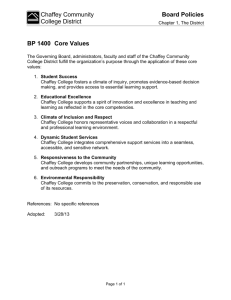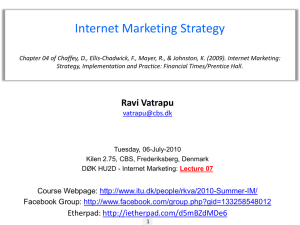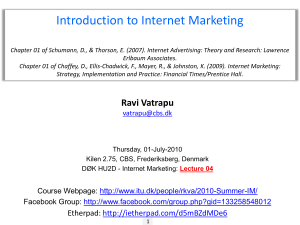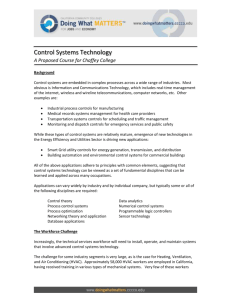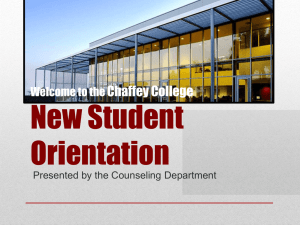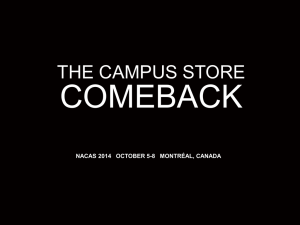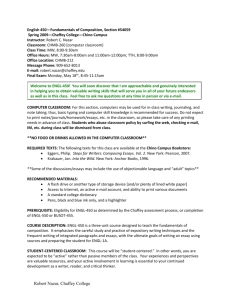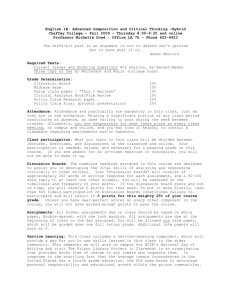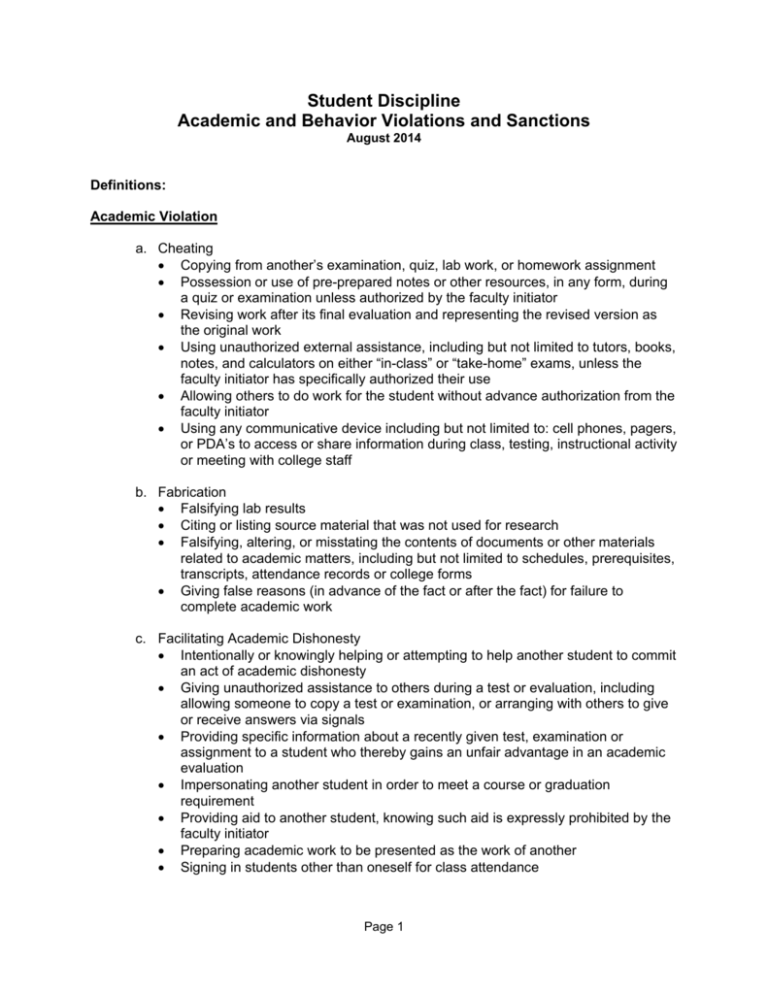
Student Discipline
Academic and Behavior Violations and Sanctions
August 2014
Definitions:
Academic Violation
a. Cheating
• Copying from another’s examination, quiz, lab work, or homework assignment
• Possession or use of pre-prepared notes or other resources, in any form, during
a quiz or examination unless authorized by the faculty initiator
• Revising work after its final evaluation and representing the revised version as
the original work
• Using unauthorized external assistance, including but not limited to tutors, books,
notes, and calculators on either “in-class” or “take-home” exams, unless the
faculty initiator has specifically authorized their use
• Allowing others to do work for the student without advance authorization from the
faculty initiator
• Using any communicative device including but not limited to: cell phones, pagers,
or PDA’s to access or share information during class, testing, instructional activity
or meeting with college staff
b. Fabrication
• Falsifying lab results
• Citing or listing source material that was not used for research
• Falsifying, altering, or misstating the contents of documents or other materials
related to academic matters, including but not limited to schedules, prerequisites,
transcripts, attendance records or college forms
• Giving false reasons (in advance of the fact or after the fact) for failure to
complete academic work
c. Facilitating Academic Dishonesty
• Intentionally or knowingly helping or attempting to help another student to commit
an act of academic dishonesty
• Giving unauthorized assistance to others during a test or evaluation, including
allowing someone to copy a test or examination, or arranging with others to give
or receive answers via signals
• Providing specific information about a recently given test, examination or
assignment to a student who thereby gains an unfair advantage in an academic
evaluation
• Impersonating another student in order to meet a course or graduation
requirement
• Providing aid to another student, knowing such aid is expressly prohibited by the
faculty initiator
• Preparing academic work to be presented as the work of another
• Signing in students other than oneself for class attendance
Page 1
d. Interference or Sabotage
• Persistently behaving in a manner that has an adverse effect on the academic
performance of others
• Destroying, stealing, changing or damaging another’s work
e. Plagiarism
• Submitting work previously submitted for academic credit without prior
authorization from the instructor of record
• Reproduction of another’s work, with or without that person’s knowledge or
permission
• Submitting as one’s own any academic exercise prepared totally or in part by
another
• Copying information from computer-based sources, (e.g. the Internet) and
submitting it as your own work
• Allowing another person to substantially alter or revise student work and
submitting it as the student’s own
• Using another’s written ideas or words without properly acknowledging the
source
• Failure to acknowledge study aids such as Cliff’s Notes or common reference
sources
• Unauthorized use of another person’s data in completing a computer exercise or
other class work
• Fraud, copyright infringement and any other noncompliance of regulations and
laws as set forth by the Federal Communication Commission (FCC), the Motion
Picture Association of America (MPAA), any other guilds or unions within the
radio, television, or motion picture industry and state, county, city, local laws,
ordinances and other current governmental regulatory commissions in the
entertainment and broadcast industries.
• Pirating and any other noncompliance of confidentiality statements such as those
signed by students in the fields of fashion and interior design
f.
Retaliation
• Retaliation of any kind against a person who reports or provides information
about suspected or alleged misconduct in good faith.
g. Unauthorized Collaboration
• Working with other students to do lab work, review books, or develop a
presentation or report without permission from the faculty initiator to do so
• Making lab data available to a student who did not attend the lab
• Jointly calculating homework problems without permission from the faculty
initiator to do so
• Having another’s help to rewrite a student paper
• Sharing sources for a take-home exam
• Working in a group on a lab assignment without permission from the faculty
initiator to do so
• Working on online course homework, quizzes, tests or other projects without
permission from the faculty initiator to do so
Page 2
Behavior Violation
A.
Obstruction or disruption of the college’s educational process,
administrative process, or other college function; disruptive behavior or
willful disobedience; open defiance of authority or abuse of Chaffey
College personnel
B.
Dishonesty; forgery, alterations, misuse or unauthorized use of any
Chaffey College documents or records, or of any instrument or form of
identification; or knowingly furnishing false information to Chaffey College
C.
Continued disruptive behavior, continued willful disobedience, habitual
profanity or vulgarity; the open and persistent defiance of authority or
persistent abuse of Chaffey College personnel and/or persistent, serious
misconduct where other means of correction have failed to bring about
proper conduct
D.
Causing, attempting to cause, or threatening to cause physical injury to
another person, including but not limited to assault, battery, or any threat
of force or violence upon a student, Chaffey College personnel, or any
other person
E.
Willful misconduct that results in injury or death to a student, Chaffey
College personnel, or any other person, or which results in cutting,
defacing, or other injury to any real or personal property owned by the
District
F.
The unlawful use, sale, possession, offer to sell, or furnishing, or being
under the influence of, any controlled substance listed in California Health
and Safety Code Sections 11053 et seq., any alcoholic beverage, or any
intoxicant of any kind; or the unlawful possession of, or offering, arranging
or negotiating the sale of any drug paraphernalia as defined in California
Health and Safety Code Section 11014.5, or any poison classified by the
Business and Professions Code; regardless whether a student possesses
a lawfully issued medical marijuana card, federal law prohibits marijuana
use, possession, and/or cultivation at educational institutions and is
therefore prohibited from any Chaffey campus property or function.
G.
Willful or persistent smoking in any area where smoking has been
prohibited by law or by regulation of the Governing Board
H.
Theft of or attempted theft of, or damage to, and/or failure to return
property of Chaffey College or any other person, or knowingly receiving
stolen property on campus
I.
Committing or attempting to commit robbery or extortion
Page 3
J.
Failure to make good on returned checks or pay debts, such as fines or
loans due to the college
K.
Unauthorized entry into college facilities, or unauthorized use of college
facilities, supplies or equipment, including unauthorized possession or
duplication of keys to any college premises
L.
Obstruction of the free flow of pedestrian or vehicular traffic on Chaffey
College premises or adjacent to Chaffey College premises, or at Chaffey
College sponsored activities, and reckless driving on college property
M.
Gambling or other unauthorized gaming activity
N.
Possession, use, sale, storage, or otherwise furnishing any weapon,
firearm, knife, dangerous chemical, fireworks, explosive, or other
dangerous object, including but not limited to any facsimile weapon,
firearm, knife, dangerous chemical, fireworks or explosive, regardless of a
federal or state license to possess the same issued to the possessor,
unless, in the case of any object of this type, the student has obtained the
written permission to possess the item from Chaffey College personnel,
which is concurred in, in writing and in advance of bringing the item to
school, by the Dean of Student Discipline
O.
Intentionally false statements against any other student, college
personnel, or Governing Board member of the college, for the purpose of
causing harm to that individual
P.
Hazing or any act that injures, degrades, or disgraces an individual
Q.
Soliciting or assisting another to do any act, which would subject a student
to expulsion, suspension, probation, or other discipline pursuant to this
policy
R.
Unauthorized use of any communicative device including but not limited
to: cell phones, pagers, or PDA’s during class, testing, instructional activity
or meeting with college personnel or unauthorized recordings of college
personnel or students
S.
Theft or other abuse of college facilities and/or computing equipment,
including, but not limited to, the following:
a. unauthorized transfer and/or entry into a file to use, read or change
contents, or for any other purpose
b. unauthorized use of phone or electronic devices such as fax, modem,
etc
c. unauthorized use of another individual’s identification or password
Page 4
d. use of computing facilities to interfere with normal operations of the
college computing system or the work of another student or college
employee
e. use of computing facilities to access, view, send, or receive obscene,
abusive or pornographic material
f. Any other act in violation of Chaffey School’s Computer Use Policy:
http://is.chaffey.edu/districtnetcomputeruse.html
T.
Violation of other state, federal, or local statutes, or college policies, rules,
or regulations while on college property, including violation of college
policies or of campus regulations concerning student organization, traffic,
or the use of college facilities
U.
Violations of other published Chaffey College regulations or policies.
These policies may include regulations governing the use of computers
and networks, parking rules, and regulations governing student
organizations
V.
Any form of sexual assault or sexual battery, whether consensual or
nonconsensual
W.
Committing sexual harassment as defined by law or by Chaffey College
policies and procedures
X.
Engaging in harassing or discriminatory behavior based on but not limited
to: ethnic group identification, national origin, religion, age, sex or gender,
race, color, ancestry, sexual orientation, physical or mental disability or
any other category protected by law, or on the basis of one or more of
these perceived characteristics, or based on association with a person or
group with one or more of these actual or perceived characteristics
Y.
Lewd, indecent, obscene conduct or expression, or repeatedly committing
unwelcome advances
Z.
Engaging in expression which is obscene, libelous or slanderous, or which
so incites students as to create a clear and present danger of the
commission of unlawful acts on Chaffey College premises, or the violation
of lawful Chaffey College regulations, or the substantial disruption of the
orderly operation of Chaffey College
AA.
Unauthorized preparation, giving, selling, transfer, distribution, or
publication, for any commercial purpose, of any contemporaneous
recording of an academic presentation in a classroom or equivalent site of
instruction, including but not limited to, handwritten or typewritten class
notes, except as permitted by any Chaffey College policy or administrative
procedure
Page 5
BB.
Engaging in an act of bullying against anyone, including but not limited
through means of an electronic act through use of Chaffey College
facilities, Chaffey College electronic communication equipment, or Chaffey
College e-mail/Websites/portals/forums
CC.
Engaging in any act of bullying by means of any electronic act, whether off
or on campus and whether or not through use of the user’s personal
electronic equipment/ device(s) or non-Chaffey College e-mail/ Websites/
communications/ forums, when directed toward a student, college
personnel or Governing Board member of Chaffey Community College, or
when directed against any individual if the act has a nexus to school
attendance/activities by posing a threat or danger to the safety of
students, personnel or property of Chaffey College, or if it materially and
substantially disrupts the school environment
SEXUAL HARASSMENT MUST BE REPORTED DIRECTLY TO
HUMAN RESOURCES, (909) 652-6532
Page 6
Sanction
The options available for discipline are defined as follows:
A.
Verbal Warning and Written Reprimand: An admonition to the student to
cease and desist from conduct determined to violate the Standards of Student
Conduct including the Student Academic Integrity Code and the Student
Behavior Code.
1. A record of the fact that a verbal warning has been given will become part of
a student’s record at the college for a period of one (1) complete academic
year.
2. Written reprimands will become part of a student’s permanent record at the
college.
3. A student may receive a verbal warning and/or written reprimand based on
the level of severity of the violation.
4. A student may petition to request the removal of a written reprimand from
their permanent file after two (2) complete academic years following the
violation.
B.
Failing Grade for an Assignment: A student may receive a failing grade for an
assignment if he/she violates the Student Academic Integrity Code.
C.
Failing Grade in Course: An academic integrity violation on an assignment may
result in a failing grade for the course.
D.
Disciplinary Probation: A student may be placed on disciplinary
probation by the Dean of Student Discipline. It may include one or all of
the following and may be imposed upon an individual or groups of
students:
1. Removal from any or all college organization offices.
2. Denial of privileges or participation in any or all college or studentsponsored activities or services.
3. Requirement to complete one or more counseling or behavioral
modification programs or classes including but not limited to
drug/alcohol diversion program, anger management workshop,
interpersonal communication workshop, life-skills class, and academic
or psychological counseling appointments.
4. Work assignments, service to the College or community or other
related discretionary assignments.
The duration of the probation may last up to two (2) academic years. After
the duration of the probation is complete, a student will revert to the status
of good standing with Chaffey College, unless a reoccurrence of a
violation of the Standards of Student Conduct occurs.
E.
Removal from Class: A student can be excluded by the instructor for the day of
the removal and the next class meeting.
Page 7
F.
Withdrawal of Consent to Remain on Campus: Withdrawal of consent by the
Campus Police for any person to remain on campus in accordance with
California Penal Code Section 626.4, where the Campus Police has reasonable
cause to believe that such person has willfully disrupted the orderly operation of
the campus.
G.
Immediate Interim Suspension: The Dean of Student Discipline may order the
immediate suspension of a student where the Dean of Student Discipline
concludes that immediate suspension is required to protect lives or property and
to ensure the maintenance of order. In cases where an immediate interim
suspension results in a long-term suspension or expulsion, the student shall be
afforded the right to a hearing within ten (10) instructional days.
H.
Short-term Suspension: Exclusion of the student by the Dean of Student
Discipline for good cause from one or more classes for a period of up to ten (10)
instructional days. Prior to the imposition of a short-term suspension, the student
shall be afforded the opportunity to meet with the Dean of Student Discipline to
respond to the charges.
I.
Long-term Suspension: Exclusion of the student by the Dean of Student
Discipline for good cause from one or more classes for the remainder of the
school term, or from any and all classes and activities of the college up to and
including one or more terms. Prior to the imposition of a long-term suspension,
the student shall be afforded the right to request a hearing.
J.
Expulsion: Exclusion of the student by the Governing Board from the District for
good cause when other means of correction fail to bring about proper conduct, or
when the presence of the student causes a continuing danger to the physical
safety of the student or others. Prior to the imposition of an expulsion, the
student shall be afforded the right to request a hearing.
K.
Restitution: A student may be required to pay for or replace District property
that was stolen or damaged due to the student’s violation. Arrangements for
payment or replacement of damaged or stolen property will be established
through the Student Discipline Office.
L.
Other Sanction: This section shall not be construed to prohibit the Dean of
Student Discipline from imposing a lesser disciplinary sanction than suspension
or expulsion when suspension or expulsion is permitted. A lesser sanction may
include, but need not to be limited to, verbal warnings or written reprimands,
probation, or ineligibility to participate in extracurricular activities.
M.
Non-student: Admission or readmission may be denied to any person who,
while not enrolled as a student, commits acts which would, were he or she
enrolled as a student, be the basis for student discipline. Before the offending
individual is denied admission or readmission, he or she may request a hearing
before the Dean of Student Discipline during which he or she will be afforded the
opportunity to demonstrate why he or she should be admitted or readmitted.
Page 8

